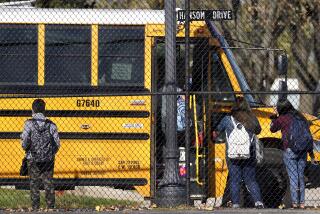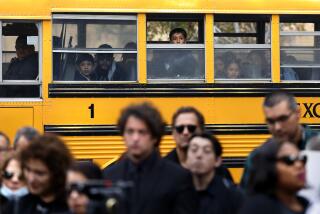America squanders its human capital
My family’s newest member popped into the world with this year’s crocuses, just in time for UNICEF’s report card on child well-being.
Unbeknownst to our bundle of joy, the country of his birth was down at the bottom of the list of 29 nations, with Latvia, Lithuania and Romania. By the time he had been on Earth a month, the Academic Pediatric Assn. had released its strategic road map, proclaiming poverty the “greatest problem for children in the U.S.” In June, as he moved into Week 12 of newborn life, the Clintons declared all the nation’s kids “Too Small to Fail.”
Thus my grandson was ushered into America’s garden of human capital.
Economists have been talking about human capital — skills, creativity, enterprise — since the 17th century, when a man named William Petty, a forerunner of Adam Smith, made one of the first attempts to estimate the monetary value of a human being.
His 21st century descendants are still on the case. Invest in families and nurture cognitive and social skills in children from birth to age 5, exhorts Nobel laureate economist James Heckman any chance he gets. The payoff — 7% to 10% on the dollar — in greater academic success, future productivity and economic prosperity is the best investment around.
Federal Reserve Chairman Ben Bernanke is also a cheerleader. “When individuals are denied opportunities to reach their maximum potential,” he said in a speech last year at the Children’s Defense Fund, “it harms not only those individuals but also the larger economy, which depends vitally on having a skilled, productive workforce.”
We’re not doing well, alas, in maximizing potential. According to the most recent “Kids’ Share” report from the Urban Institute, federal spending on children fell by $2 billion from 2010 to 2011, the first dip in 30 years. The children’s share of the budget pie was reduced from 10.7% to 10.4%. By 2022, the children’s portion of the budget is expected to drop to 8% and their share of GDP is expected to drop from 2.5% to 1.9%, which will include significant cuts in early care and education. With the Census Bureau reporting nearly 25% of the nation’s children younger than age 6 in poverty, this is not good news.
Relative to other advanced economies, the U.S. track record is dismal. Just take a look at the Social Expenditure Database from the Organization for Economic Cooperation and Development. We’re at the low end in rankings of average public spending on family benefits in the form of cash, services and tax credits. Or at the OECD’s Social Justice Index, which examines, among other policies, health quality, access to education and poverty prevention in 31 countries. In the category of health, the U.S. stands at No. 23; in access to education, it’s at No. 20, on the cusp of the lower third of the nations surveyed.
We now know more than ever about how to nurture human capital, with eye-popping technology offering graphic evidence of the rapid pace and complexity of brain development in the first years of life. The bottom line is that kids need time for sensitive, stimulating interactions with adults to promote growth, resilience and mastery, the foundations for their healthy development and academic success. They need access to good healthcare and nutrition, and high-quality early learning settings, not to mention viable communities invested in their well-being.
But why bother? By some estimates, human capital creates two-thirds of a modern economy’s wealth. That’s a pretty compelling argument, especially for those who have no truck with the rights of children, or warm and fuzzy feelings about the pint-sized members of our species. I prefer to look through the lens of child development expert Alison Gopnik, who sees babies and young children as the “R&D department of the human species — the blue-sky guys, the brainstormers.”
Existing U.S. policies give short shrift to our budding innovators. They also leave families, venture capitalists for these future wealth producers, in the lurch. Americans labor more, and longer, than any other people in the world. The work-family juggling act has reached Sisyphean proportions, and stress levels are stratospheric. Parents, and other caregivers, need adequate resources, knowledge and support in the work of raising the next generation — like their peers in the global village.
Isn’t it time we rolled up our sleeves, joined the rest of the world’s advanced economies and changed the calculus for children?
Susan Ochshorn is the founder of ECE PolicyWorks and the author of a forthcoming book about the importance of early childhood education.
More to Read
A cure for the common opinion
Get thought-provoking perspectives with our weekly newsletter.
You may occasionally receive promotional content from the Los Angeles Times.






